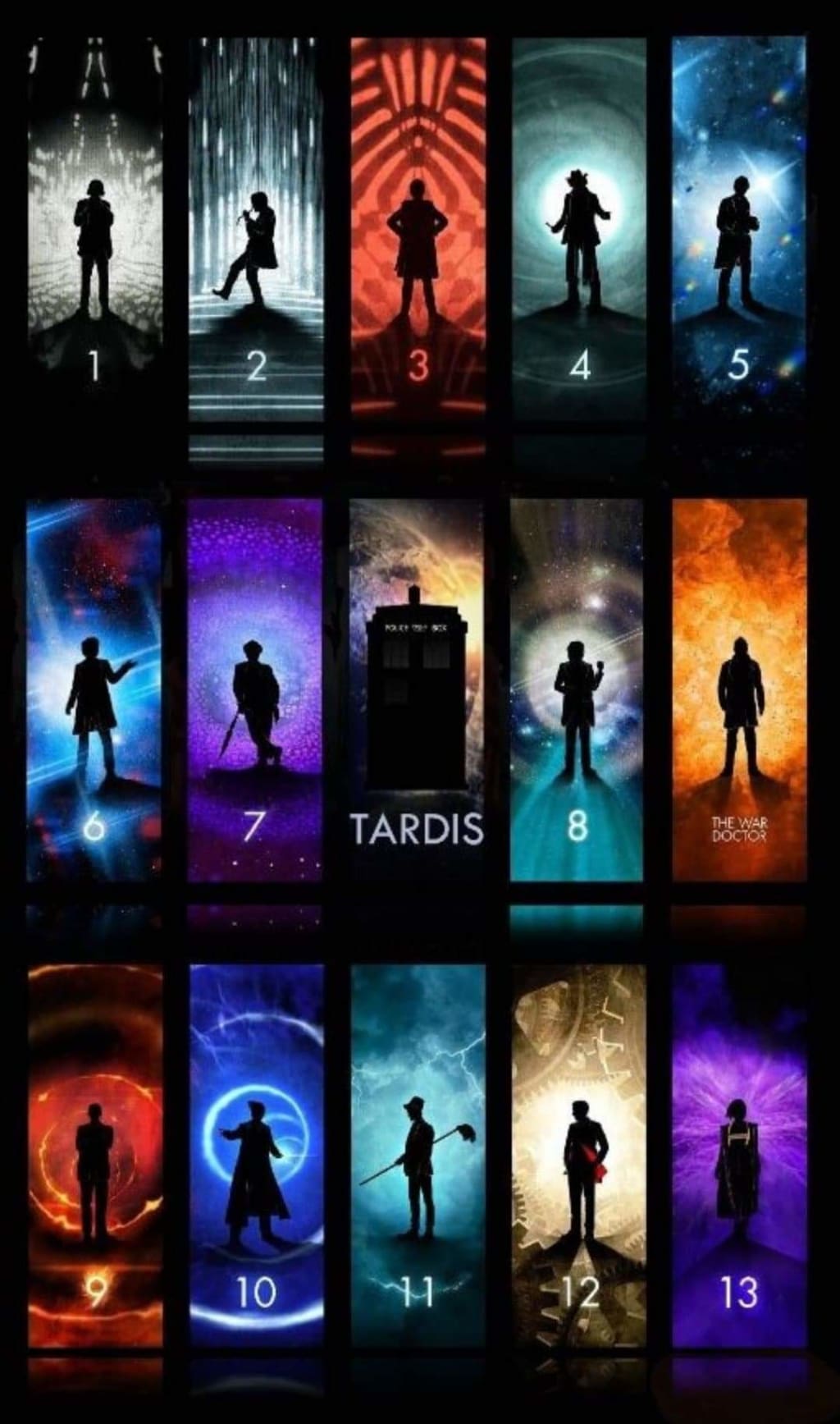Doctor Who
My Favourite Quotes, and Why

The Philosophy of Who
Doctor Who is associated with many things. Rubber monsters, wobbly sets and, in more recent years, romance and high octane action. Something it often isn’t credited for, however, is the wealth of insightful and moving reflections it contains on both the human condition and nature of all things.
If you ask any fan worth their salt about their favourite moments in the history of the show, chances are they won’t relate the arrival of a monster or the special effect spectacular of seeing a world decimated, but instead will probably point you toward a much more subtle, empathy laden moment that resonated with them personally.
With that in mind, here are some of my personal favourites:
“The way I see it, every life is a pile of good things and bad things. The good things don’t always soften the bad things, but vice versa, the bad things don’t always spoil the good things and make them unimportant.”— The Doctor – "Vincent and the Doctor"
I will kick off with a fairly well known one: the Doctor's comforting words to Amy Pond once she has learned of Vincent Van Gough’s fate. Throughout the story of "Vincent and the Doctor" (a very sensitive portrayal of mental illness, with an only slightly rubbish monster), we see our heroes get to know and befriend Vincent, and arguably become the most important people in his life, as they “bend” the laws of time to take him to his future to see how highly his artwork is regarded and hopefully allow him to reframe his view of himself and his influence on the world. Unfortunately, they discover it was all for nought when they return to the present day and Amy realises that, despite their best efforts, Vincent had still taken his own life. Amy is understandably distraught by this and the Doctor offers the rather beautiful words above as comfort.
He succinctly explains that although a life may be wrought with tragedy and pain and that even if there is not a happy ending, you can add to the person who is suffering's life in a positive way. Existence is never solely absolutes and you can have a decisive impact on a person.
“Never cruel or cowardly. Never give up, never give in.”—Various people
Originally used as a thumbnail sketch by 70s script editor Terrance Dicks to describe the character of the Doctor, the phrase took on new meaning when it was used in the 50th anniversary special "The Time of the Doctor." It perfectly encapsulates the founding idea of who the Doctor is; he is brave, he is optimistic, he is kind and he is, above all else, annoyingly stubborn.
“The universe has to move forward. Pain and loss, they define us as much as happiness or love. Whether it’s a world, or a relationship… Everything has its time. And everything ends.”—Sarah Jane Smith – "School Reunion"
The Doctor almost always (when he’s not in an existential sulk) chooses to have a human companion with him. I like to think the above reason illustrates why. The Doctor is timeless, having lived for thousands of years and walked in countless times. To him, the human lifespan is astoundingly short, and with that comes the pain of loss, something he knows only too well. Sometimes it takes the eyes of a mortal being to give perspective to the immortal. It is our mortality that gives us urgency and purpose, and it is those losses we all sustain that often have the greatest impact on our lives for good or ill.
“Courage isn’t just a matter of not being frightened, you know. It’s being afraid and doing what you have to do anyway.”—The Doctor – "Planet of the Daleks"
A quote that needs little explanation as it is so beautifully written that it explains itself. From a personal perspective, having watching this as a young boy on BBC2, this became a mantra for myself through various periods of childhood anxiety and worry.
“Human progress isn’t measured by industry. It’s measured by the value you place on a life. An unimportant life. A life without privilege. The boy who died on the river, that boy’s value is your value. That’s what defines an age, that’s… what defines a species.”—The Doctor – "Thin Ice"
Not necessarily a political point but more a humanist one. After witnessing a child drown by falling through the ice due to the Machiavellian plans of local industrialist Sucliffe, the Doctor decides to school a human on the basic principles of being human. A wonderfully understated and moving performance by the often maligned Capaldi really drives this point home.
“I can't stand burnt toast. I loathe bus stations—terrible places, full of lost luggage and lost souls. And then there's unrequited love, and tyranny, and cruelty.”-The Doctor – "Ghostlight"
This quote in my humble opinion really brings home the lasting success of Doctor Who, that marrying of the mundane and everyday with the fantastical and terrifying. When asked by Ace what he hates, the Doctor lists off—with a look like steel from the seventh Doctor—the tiresome annoyance of burning toast with the horrors of tyranny a cruelty. It could be the Doctor’s aloof alien morality that lumps these things together (this is the incarnation of the Doctor who tried to listen to an apple after all), but its easy to see how writers like Neil Gaiman took inspiration from this show and its turn of phrase.
“All over the world fools are poised, ready to let death fly. Machines of death, Morgaine, screaming from above. Light brighter than the sun. Not a war between armies, nor a war between nations, but just death. Death gone mad! A child looks up into the sky, his eyes turn to cinders. No more tears, only ashes. Is this honor? Is this war? Are these the weapons you would use?”—The Doctor – "Battlefield"
An odd choice perhaps, but the Doctor’s rallying cry for the CND in an attempt to stop Morgaine (yes, the one from Arthurian legend) launching a nuclear strike and wiping out millions of innocent lives has extra significance later on. When looking back on how the Doctor regards weapons of mass destruction and then how he was forced to use the Moment to wipe out billions upon billions of lives really gives this quote some retrospective pathos. The man who spent hundreds of years saving lives and doing so non-violently suddenly forced to end so many lives really gives the Eccleston’s Doctor additional weight to his survival guilt-laden portrayal.
“When I was a little boy, we used to live in a house that was perched halfway up the top of a mountain. And behind our house, there sat under a tree an old man, a hermit, a monk. He'd lived under this tree for half his lifetime, so they said, and he'd learned the secret of life. So, when my black day came, I went and asked him to help me. I'll never forget what it was like up there. All bleak and cold, it was. A few bare rocks with some weeds sprouting from them and some pathetic little patches of sludgy snow. It was just grey. Grey, grey, grey. Well, the tree the old man sat under, that was ancient and twisted and the old man himself was, he was as brittle and as dry as a leaf in the autumn. He just sat there, silently, expressionless, and he listened whilst I poured out my troubles to him. I was too unhappy even for tears, I remember. And when I'd finished, he lifted a skeletal hand and he pointed. Do you know what he pointed at? A flower. One of those little weeds. Just like a daisy, it was. Well, I looked at it for a moment and suddenly I saw it through his eyes. It was simply glowing with life, like a perfectly cut jewel. And the colours? Well, the colours were deeper and richer than you could possibly imagine. Yes, that was the daisiest daisy I'd ever seen. So, later, I got up and I ran down that mountain and I found that the rocks weren't grey at all, but they were red, brown and purple and gold. And those pathetic little patches of sludgy snow, they were shining white. Shining white in the sunlight.”—The Doctor – "The Timemonster"
I agonised on the final choice for my collection of quotes that summed up the essence of Who. There were so many other worthy contenders from fantastic stories that it seems ironic that the one I have chosen is from one of the most often mocked. That being said, this scene is an absolute beauty. Heavily influenced by the Buddhist leanings of then show runner Barry Letts, it shows the genesis of the Doctor's wish to travel and see everything he can and the wonder he feels in even the most mundane events. This was the catalyst for the madman with a box to leave the corrupt Timelord society and strike out on his own to carve a metaphorical line in the sand between fairness and decency and tyranny and fear.
All because of a daisy.
But then thats the entire philosophy of Who. Even with all of time and space to explore, all the variety and colour of the universe, there can be and is beauty in the most mundane and banal things about us. You just have to embrace it, go along with it, and most of all, in the words of the 12th Doctor, “be kind.”
~ Fenric
About the Creator
The One True Geekology
"Strange women lying in ponds distributing swords is no basis for a system of government." - Dennis the Peasant
Come find us at itsgeekology.com/collective and www.facebook.com/itsgeekology/






Comments
There are no comments for this story
Be the first to respond and start the conversation.